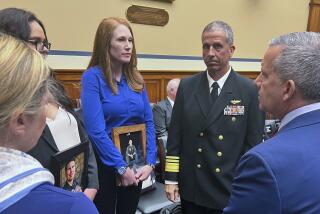Pilot Questions Goggle Training
- Share via
WASHINGTON — An Army flight instructor, defending the night-vision goggles used by helicopter pilots, testified Tuesday that a series of fatal nighttime crashes may have stemmed from efforts by the military to ask more of the goggles than they were designed to deliver.
“Today’s aviators need to be protected from themselves,” Army Reserve flight instructor David E. Broadnax told the House Armed Services subcommittee on investigations. “I feel strongly that we need to review our operational training and determine if we are asking our pilots to perform beyond their equipment and human limitations.”
Broadnax, a Vietnam combat pilot, called on the Army to suspend the use of the AN/PVS-5 night-vision goggles for at least 30 days while safety experts and others look for possible flaws in the military’s night-vision training programs. The Army, Air Force and Marine Corps are slowly replacing the older goggles with the newer, more efficient AN/AVS-6.
But Army generals, questioned about 49 accidents involving night-vision goggles that killed 137 Army, Marine and Air Force helicopter crew members and their passengers since 1978, flatly rejected a suggestion to suspend use of the light-amplifying goggles.
“We have no choice,” Maj. Gen. Ellis D. Parker, commanding general of the Army’s aviation center at Ft. Rucker, Ala., said. “We have to fly at night and we have to fight at night.”
He expressed pride in the Army’s safety record and said that he would not use the older goggles for training if he thought they were unsafe. He attributed most of the accidents involving the use of the goggles to pilot error.
“If we tell a pilot to go fly and train in a familiar area, and he decides to go out and fly in an unfamiliar area and hits some power lines and crashes, it’s not the goggles’ fault,” Parker said after the hearing.
Subcommittee Chairman Nicholas Mavroules (D-Mass.) said that he was not prepared to blame the goggles for any of the accidents. “But I believe, based on the information that has come to the attention of the subcommittee, that this issue should be reexamined by the Army,” he said.
Rep. Larry J. Hopkins of Kentucky, the ranking Republican on the subcommittee, called it “tragic and disturbing” that lives have been lost. “It is even more disturbing, however, when we continue to exact a human toll because we fail to face up to the existence of a problem,” he said.
Broadnax, a flight instructor with the 120th Army Command in Columbia, S. C., said that night-vision goggles are one of his most important tools.
Mavroules promised to hold more hearings, at unspecified dates, on the Army’s use of night-vision goggles.
More to Read
Sign up for Essential California
The most important California stories and recommendations in your inbox every morning.
You may occasionally receive promotional content from the Los Angeles Times.













